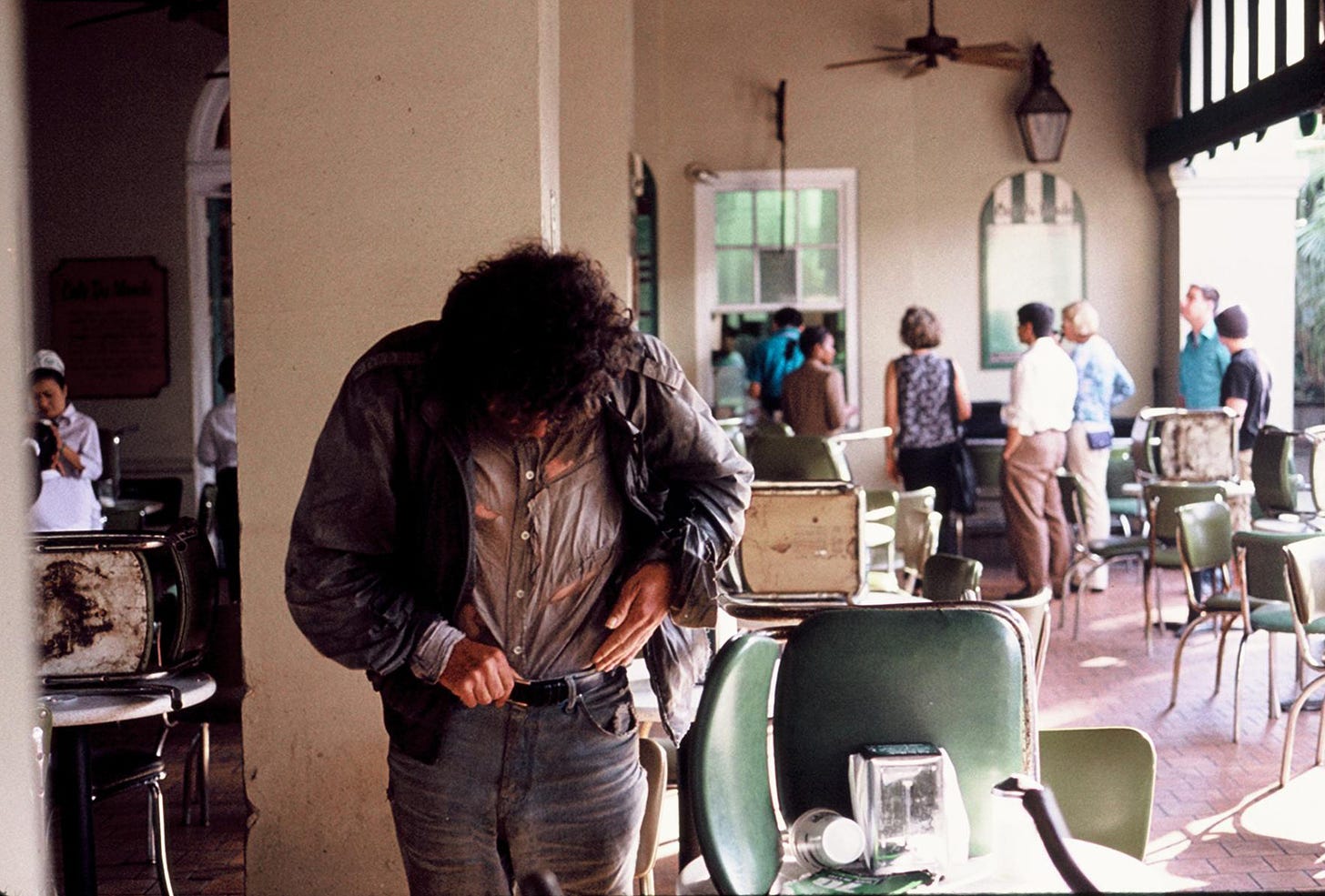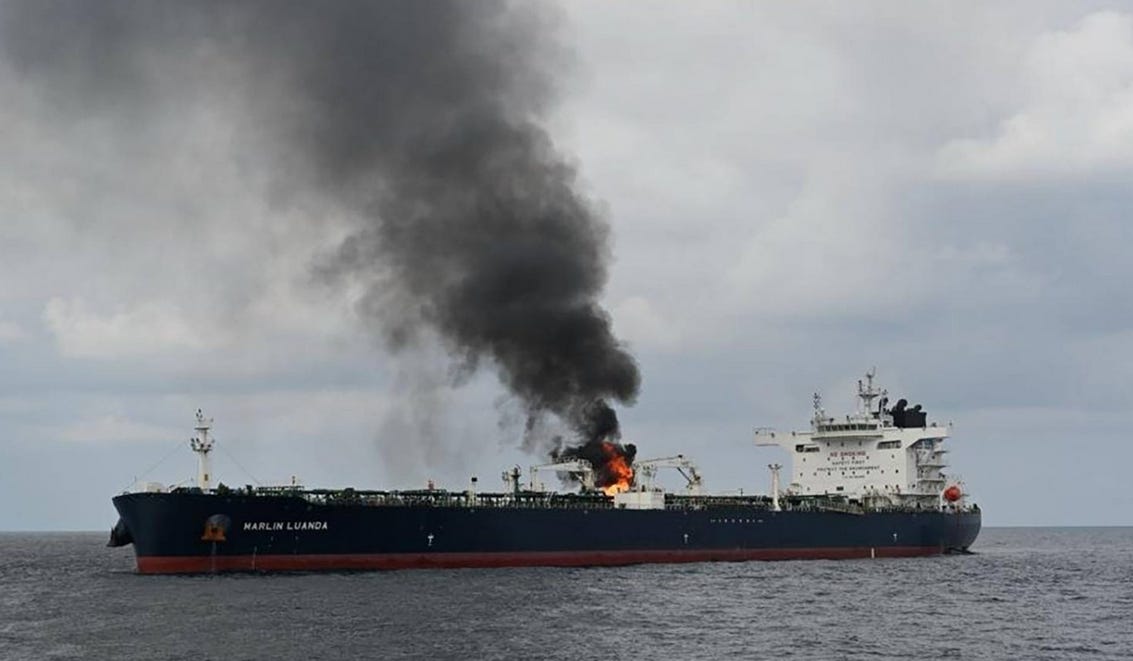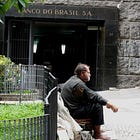Good news! There is always time to prepare
In the second part of our interview with the Stoic Survivor, he says: "The thing to realize about time is the price of delaying action. The sooner you learn and take action, the lower the cost."
This is part two of our interview with Fabian Ommar, the author of Street Survivalism : A Practical Training Guide To Life In The City. In the first installment, Fabian told us about the lessons he learned living through an economic crisis in Brazil, why he experimented with living on the streets, and why he thinks ‘collapse’ is a gradual process rather than a sudden event. Today, he shares strategies and insights that can help you prepare for the uncertainties ahead.
Read part one here.
Based on your own life experience and your own red-pill moment, you decided to share with others some concepts and strategies that can help them prepare for an uncertain future. Tell us about that and whether there's still time to put strategies in place.
It's a process; as people, we’re constantly learning. I can say though, on net balance, training in the streets indeed made me more prepared in ways hard to express. It also allowed me to develop a method, a system that ordinary folks like me can replicate and benefit from. Sharing and teaching helps others to improve, but it also helps ourselves and that’s great. It’s the reason why I started writing, consulting, giving direct guidance, those things.
Everything I learned and did made a big difference during subsequent crises, such as the 2013-2016 period when a wave of political manifestations and violent riots led to a presidential impeachment, the second in Brazil’s history. Or the prolonged drought in 2017. Or the 2018 truckers strike. It also served me well during the COVID-19 pandemic.
There is always time to prepare. If we're alive and sane, there's time. The thing to realize about time is the price of delaying action. It's a curve: the sooner we learn and take action, the lower the cost.
It's not rocket science: someone wanting to prepare for adversity should seek controlled exposure to adversity. On top of that, develop some skills and train with consistency, increasing the load and adding complications. If you have a method, a blueprint, only commitment, dedication and discipline are required. Long-term mentality is necessary for a long-term game. That sounds like self-help cliché, but everything is cliché if no action is taken.
So I keep going out, to both the streets and the wilderness, as training and hobby, just not as often due to other life commitments; I’m a normal guy, with a family, a small business, dogs to walk, friends to talk with.
Another thing to keep in mind is that we must adjust our strategies as conditions change; sometimes these changes require a different type of preparation. I like to try new things and learn new stuff. But I admit being attracted to the nomadic, independent lifestyle, something of a hobo spirit, so I find the time to keep going out.
In the preface of your book you give simple examples of Thirdworldization like "you'll no longer be able to go out wearing fancy clothes, jewelry and watches... or park your car anywhere and forget it while you go up to a friend’s apartment to enjoy a game and a few drinks." What are other examples of things people should prepare themselves for?
The above is one example of “islands” or ghettos — some of them are no-go zones — existing in cities inside a nation, in which life isn't dictated by the law or customs of the host society, but by those of an alien culture or even a parallel power.
It's wrong to think you can opt out or altogether avoid this reality. Poverty, crime, and violence don't stay contained when the system gets weak and inefficient. The state can't keep the criminals inside ghettos, much like Israel can't contain Hamas inside Gaza, or the US can’t keep illegals from crossing its borders. I’m generalizing and simplifying here, it’s a complex topic — but my point is thinking that it might be possible or easy to isolate oneself is an illusion.

There are more examples, of course. Sometimes seemingly minor stuff can drastically affect people’s lifestyle and routines. For instance, not being able to have lunch on a street table outside a restaurant without being harassed (or worse) by homeless, peddlers, beggars, bums, etc.
Currently, you might dismiss that as a nuisance, but wait to see how impactful those and other small, daily issues and worries impact on your quality of life over time. It’s stressful because it stays with us and weighs us down.
And then there’s those second- and third-order effects I talk about, associated costs and all that. One example is what I call "crimeflation," or the price increases on services and goods resulting from additional costs for businesses and commerce with extra security, insurance, maintenance and loss resulting from crime, depredation, dilapidation, that kind of stuff.
It’s that, or they simply shut doors, or move elsewhere. It's happening in California, Chicago, Paris, and it’s only just starting. There are other developments, too: drops in events and tourist visitation, unemployment, devaluation, abandonment — in short, decay. That’s Thirdworldization. The concept of ‘shit hits the fan’ (SHTF) isn’t a single event, but a chain of consequences. A softer or slow burn SHTF is still SHTF.
As for the individual, I think people must be aware of the suffering that comes with all that on top of other preparations. I’m talking about mental illness, depression, and stress leading to increased domestic violence, road rage, drug abuse, also animal abandonment and that kind of stuff. Even if you manage to be OK, being surrounded by suffering and decay has an effect, so it’s important to prepare for that, too, mentally and spiritually.
What advice do you offer people who are awake and aware but don't know how to prepare?
The best thing anyone can do, and I don’t mean just for a SHTF scenario, but for life in general, is to invest in themselves. Become stronger overall: finances and resources but also body, mind and spirit. The natural state of life is entropy, curveballs, unpredictability, so we must build a reserve and keep constantly working to be able to face the storm and come out in better shape.
That’s the mentality — keep moving towards improvement, even a little every day, with consistency. It is achievable; no one’s asking anyone to turn water into wine or anything, so stop talking and start working.
Other than that, there’s all that common-sense preparedness stuff: seek quality, real-life based and time-proven advice. Avoid apocalyptic porn, myths and doomsday commercialism. Study history but follow the trends. Stuff is important, but not the be-all and end-all. The world won’t end but your economies just might if you let it. Understand the difference between possible and probable. Resources and time are always limited, so in many ways preparing means compromising.
I must also add, all that sounds darker in prospect than it is in reality. As the Stoics say, we suffer more in imagination than in reality. I sense citizens of the First World will feel the loss itself more than the actual consequences of it. That’s my opinion. Many will fall along the way, but the rest, the majority, will adapt; we're crafty and resilient creatures. Life goes on and it's perfectly possible to be happy and move up; it’s important to keep that perspective in mind.
Did the pandemic change the way you look at this advice? If so, how? If not, why not?
It impacted me, for sure, some beliefs and strategies got confirmed by events and developments, others proven wrong or ineffective. Fine, that’s how it’s supposed to be, no one gets everything right all the time so I try to stay open and adapting, that’s the most important.
But I'm prepared for worse stuff than a virus with a 0.1% fatality rate, mass hysteria and wacky governments… or so I like to think. That may sound brash, but what I mean is, objectively, if the impact of something isn’t proportional to the actual threat, then I’m doing too many things wrong and need to revise my strategy, and above all, my mindset.
So when COVID-19 struck I worried less about the virus than the consequences it portended, including how it would affect others who were not prepared or those more fragile against COVID. Even though the virus was real, I can't shake the feeling that a lot about the pandemic was fabricated, and the responses exaggerated. Fear mongering, mass hysteria, all that.
I registered to volunteer — twice — at the emergency centers the moment their construction was announced here. Big fanfare, all that. Fine. I’m in good health, so I wanted to help, do something. They never contacted me. The centers remained mostly empty, thankfully so, I must say. Then just gone, no one said anything about it anymore. It's just one thing, sure, but quite telling.
That’s why critical thinking is so important, especially when the situation involves crucial and grave decisions. Hindsight is 20/20, but that's easy; anyone can have that. If you want to survive and thrive in any situation, but dire ones in particular, you must be able to see more clearly as things are unfolding, not after. Pause and observe, shut off outside noise for a moment and ask your inner self what’s the right thing to do, think consequences and long-term.
Either way, I'm just an ordinary middle-aged bloke with little information on big world matters. We never really know the truth or all angles, but that shouldn’t matter. It’s perfectly normal to feel doubt, fear or anxiety, but not to let those things impede advancement or paralyze us.
What else do you think people should know about the coming future?
Realistically, things are still very good on the ground, and that’s what matters. I’m just back from Europe and even though I was there when German farmers started gathering and entering cities to protest, I can assure you life is 90% normal in 90% of places, which is exactly how it’s been for the past 20 or 30 years and more than one can hope for on this planet. Here in my country they’re 70% and still life’s very normal.
Sure, that can change in a moment and we shouldn’t piss off the people who grow our food or transport our stuff. Also, I saw signs of poverty spreading, some effects of mass migration looming. I suspect that will be big soon. There are also conflicts popping up everywhere, prospects of more geopolitical turmoil, and that’s concerning, too. Same on the attacks on freedom and liberty, the increasing instability in the rigged, corrupt finance system. My country is quickly sliding into a dictatorship, something similar is happening in Canada, UK, and many others. All that is concerning.
I might add those things have always existed in the world, but something bigger is brewing and people can feel it. So I believe there’ll be even more instability and also more shocks. I’m probably stating the obvious, or preaching to the choir. I’m preparing for a growth in violence and crime. I say that often because I live in that reality and it’s the first visible sign of societal decay. That impacts us directly, on the ground, daily.

I also keep paying attention to the responses to all that crap, because these can be even worse than the problems themselves. That’s perhaps the main lesson from COVID-19, developments often impact more and befall on the population. They also affect the production and supply chains, and I don’t mean empty shelves only but strikes, interruptions in essential services and utilities, grid-downs, bank runs and savings freezings, confiscations, those things.
Please note I’m not predicting or forecasting anything. A lot of that is already happening, because it happens whenever the world gets the way it is now. No one needs a crystal ball to spot the trends, to see what’s coming.
But hey, we're still living in the most peaceful and prosperous period of humankind ever. And this idea that we should avoid pain, loss, and death at all costs is new. But it's BS, we advance through suffering and hardship. We struggle to adapt, but past that, it's life as usual, and sacrifice pays. What doesn't kill us makes us stronger and all that.
One final warning: don’t think for a moment that, whatever happens, the bills will stop coming every month or the government will cease collecting taxes or raising them. That never happens, not even in war when chaos and lawlessness increase. And you’ll keep paying everything in currency, not gold or bitcoin, though it’s wise to keep something out of the system at all times. So, keep enjoying but also working hard and investing in ways to generate income, save as much as you can, downsize, lay low. In any SHTF, people’s finances go down first, not the grid.
How do people learn more about you and read your book? Are there any plans for more books in future?
My crisis preparedness and survival strategy is based on two main principles, or “legs”: short-term preparations to overcome a shock in my home (bug-in), and mobility for relocation and resource acquisition for post-shock crisis management (street survivalism and relocation/evasion). These principles are contained in my Crisis Preparedness Trilogy series, available on Amazon.
The first book, Street Survivalism : A Practical Training Guide To Life In The City from 2018, covers the part of urban mobility, resource mapping and acquisition, situational awareness, personal safety, street and people reading, and related topics. The second title is due in March of this year, it covers Home Preparedness and contains grid-down simulations, strategies, exercises and routines for a safer and more comfortable shelter-in-place. To prepare for shortages, rationings, power outages, and other disruptive events. It’s based on my practices and also what we lived during the crises of the 70s and 80s.
Finally, the last book will be a Bug-Out and City Evasion Exercise guide. It’s more of an exercise, not really a bug-out template though it will help with that for sure. Bug-Out dry runs are like a backpacking/camping trip but with a strong tactical and strategic slant rather than nature enjoyment. It’s fun and I still do that on occasion, going to and from my folks’ property in a small rural region about 100 miles from where I live.
I also write regularly for The Organic Prepper and Mind4Survival, a mix of Third World news and analysis, varied topics, practical tips, street and wilderness survival skills, which is what I do in my free time.
Thanks and stay safe, I wish everyone a great 2024.
Please note that links to Fabian Ommar’s book — Street Survivalism : A Practical Training Guide To Life In The City — are Amazon affiliate links from the Collapse Life store.



